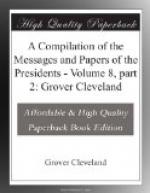In giving to Congress information of the state of the Union and recommending to their consideration such measures as appear to me to be necessary or expedient, according to my constitutional duty, the causes and the objects of the present extraordinary session will be explained.
After the President of the United States received information that the French Government had expressed serious discontents at some proceedings of the Government of these States said to affect the interests of France, he thought it expedient to send to that country a new minister, fully instructed to enter on such amicable discussions and to give such candid explanations as might happily remove the discontents and suspicions of the French Government and vindicate the conduct of the United States. For this purpose he selected from among his fellow-citizens a character whose integrity, talents, experience, and services had placed him in the rank of the most esteemed and respected in the nation. The direct object of his mission was expressed in his letter of credence to the French Republic, being “to maintain that good understanding which from the commencement of the alliance had subsisted between the two nations, and to efface unfavorable impressions, banish suspicions, and restore that cordiality which was at once the evidence and pledge of a friendly union.” And his instructions were to the same effect, “faithfully to represent the disposition of the Government and people of the United States (their disposition being one), to remove jealousies and obviate complaints by shewing that they were groundless, to restore that mutual confidence which had been so unfortunately and injuriously impaired, and to explain the relative interests of both countries and the real sentiments of his own.”
A minister thus specially commissioned it was expected would have proved the instrument of restoring mutual confidence between the two Republics. The first step of the French Government corresponded with that expectation. A few days before his arrival at Paris the French minister of foreign relations informed the American minister then resident at Paris of the formalities to be observed by himself in taking leave, and by his successor preparatory to his reception. These formalities they observed, and on the 9th of December presented officially to the minister of foreign relations, the one a copy of his letters of recall, the other a copy of his letters of credence.
These were laid before the Executive Directory. Two days afterwards the minister of foreign relations informed the recalled American minister that the Executive Directory had determined not to receive another minister plenipotentiary from the United States until after the redress of grievances demanded of the American Government, and which the French Republic had a right to expect from it. The American minister immediately endeavored to ascertain whether by refusing to receive him it was intended that he should retire from the




